=

© 2018 - All Rights Reserved, The Dati
|
Two Million Raped in War-Torn Congo
In Congo it is more dangerous to be a female than a soldier. Rape, torture and humiliation are used as weapon - majority of the victims are children. Today their only hope are the doctors that dare to work here. Doctor Mukwege is one of them. When he appealed for an intervention from the rest of the world he became the victim of attempted murder.
Text: Magda Gad
Foto: Niclas Hammarström A 14- year-old girl huddle in the chat room at the Panzi Hospital . She has a black shawl around her neck. When she starts to talk she pulls the shawl up over her face. She does not want her eyes to see. Two years ago she was forced to keep them open. It was evening and dark; the soldiers gave her a lantern to keep in her hand. They showed where she would direct the light. In the light, she saw four armed men who took turns to rape her mother. It is the last memory the image she has of her.
- The same men raped my sister. Then they said that I should put myself on the floor and then they stuck their fingers inside me. Afterwards, I asked Dad: Where's Mom? He replied: They killed her.
The shawl has become deep black with tears. The girl continues to tell behind it. Half a year ago soldiers came back to the village again.
- They broke into our house and raped me and my sister. She died. They put her up on the wall.
Pinned to the wall?
- Yes. With spikes. Like Jesus.
Outside the bare room where the girl has put herself in a corner is a yard. It is full of girls and women. Nearly 250. They sit silently on benches. Some do needlework and others lie on the ground looking at something else than the air in front of them.
Doctor Mukwege, the hospital's founder and director, sees them from the operating room. In this part of the Democratic Republic of Congo - the east - he is shortly called > le docteur <. The Doctor. He stops in front of one of the large windows; daylight is important because you cannot rely on electricity. His shoes make him even a little longer, the white coat hangs around the round shoulders.
Behind him is a colleague opens a stomach and tries to fixate a uterus. On another surgical table a young woman's bare legs are placed, slightly raised and wide apart. The anesthetist pinching her in the side, noting that back anesthesia has had an effect. It smells like iodine and it's warm, speculum and the scalpel are ready. Doctor Mukwege focuses his eyes so that the forehead wrinkles above the mask. It is the third time he will try to repair this woman. She is one of those who usually sit in the yard - one of those who have a history similar to the 14 -year-old girl's.
Over 33,000 patients have been treated within the project for survivors of sexual violence (SSV - survivors of sexual violence) at the Panzi Hospital in Bukavu - a city located at the border of Rwanda on five peninsulas that spreads out like green fingers in the Blue Lake Kivu - since 1999. The first woman came in with gunshot wounds in the vagina and thighs after she was gang-raped. It was assumed to be a single brutal act in the war that was raging. Three months later the shock came: 45 more women came - with the same injuries.
Since then, the madness just continues. War victims so far: six million dead, two million raped and several generations condemned to poverty, forced to flee, desecrated, slaughtered and had their genitals destroyed.
Doctor Mukwege lives in the result of torture. On the list of what the armed groups are doing to his patients: chop the head of their husbands and put it on the women's chest during the rape, forcing the raped to sit on hot coals, throwing acid over the genitals, cuts into the breasts, heat a plastic bottle over a fire and run up into the vagina. As a rule it out in the full glare and in some villages, as many as three out of four women have been raped. No ages have been spared.
Professor Ellinor Ädelroth voice trembles when she talks about child rape.
- We had a three year old who was completely torn. There was nothing left of the rectum and genitals. Doctor Mukwege just screamed as he would operate on her.
How often do you get such young patients?
- It happens now and then.
She sits in her simple office. Lung professor, head of department, head physician from Umeå University in Sweden who has worked here back and forth since 2009.The swedish missionary work in Bukavu goes further back in time. Swedish Medical Mission founded Panzi Hospital together with Pentecostal Mission Development , PMU , and Ellinor Ädelroth came here with the Pentecostal Church.
Since last fall, when she retired from her post at Norrlands University Hospital in Sweden; she works full time at Panzi - teaches medical students, restructures and has lung reception.
She shows around among the buildings - it is a large hospital with 450 beds - and stops in the backyard where patients are on their knees rubbing clothes in tubs.
- Something we would need is washing machines. But we cannot buy any. The money we get from aid organizations is earmarked.
That Ellinor Ädelroth in one sentence deals with child rape and the next household appliances does not feel weird - that's the reality here. Length of stay can be up to several months, and some patients do not want to go home after the treatment is over. Others cannot go home. Then Panzi becomes their home.
There is a transit accommodation, Dorcas, where women who are exiled from their villages - because they have been raped - may stay until they are able to move on.
Peace negotiations are now underway in the region and the UN's costliest strength ever - Monusco - is in place for the price of $ 1.4 billion per year. This is equivalent to 26.8 million crowns - per day.
Despite that, the sexual violence increases. Every minute women get raped and according to a new report from organization Save the Children, two-thirds of the victims are minors.
- The UN has failed to protect the population. They are passive. UN we can have or lose. We have women here who say that UN soldiers stood and watched as villagers were raped, said Ellinor Ädelroth.
What does the government do?
- The government, which government?
In the surgery room doctor Mukwege just had a long hour. He has just inserted a urinary catheter. The young woman has fistulae and a broken urethra. He has failed to repair it.
When he walks through the swing doors he is met by his security guard - a straight -built woman with an equally straight Kalashnikov - who follows every step. He takes off his mask and gloves and then stands silently.
- That has not been done with desire, it has been done with hate, he finally says in the end.
Hatred is a core that he often returns to. Says:
- If you plant hatred into people, you cannot expect to get love.
|
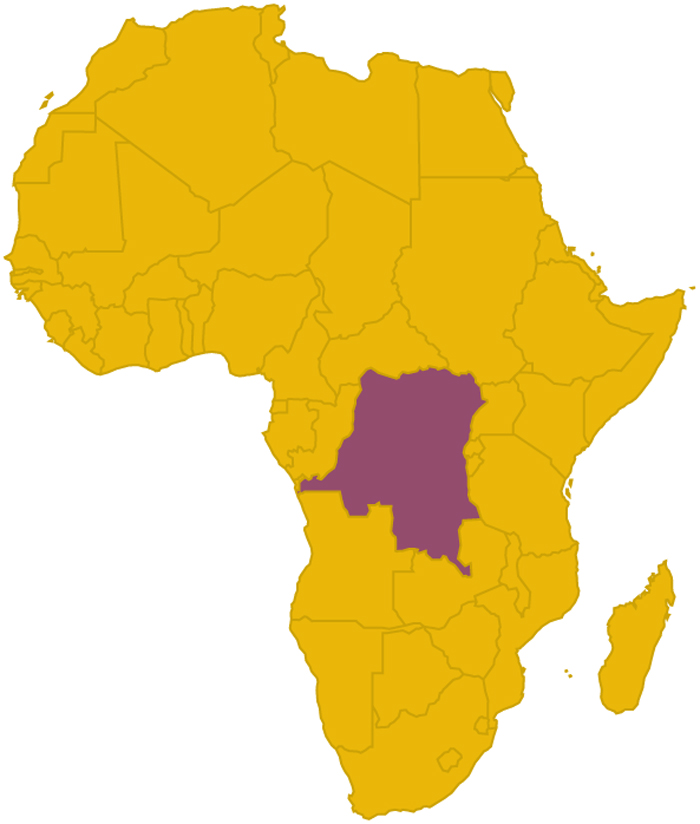
Illustration: Typoform
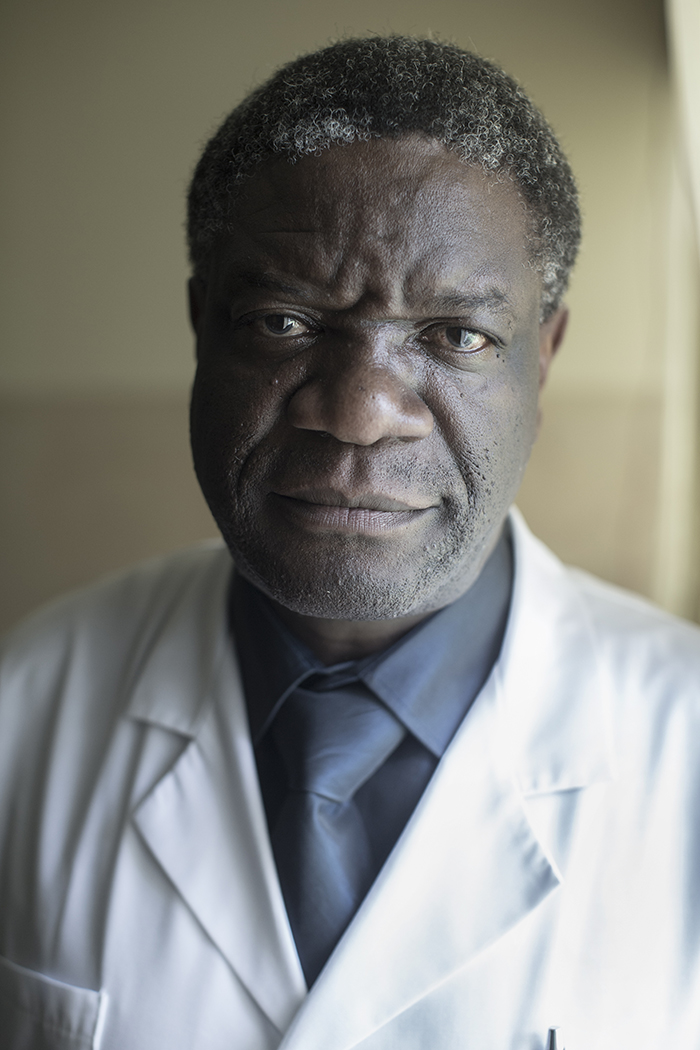
Dr. Mukwege has been nominated for the Nobel Peace Prize - an award he does not want.
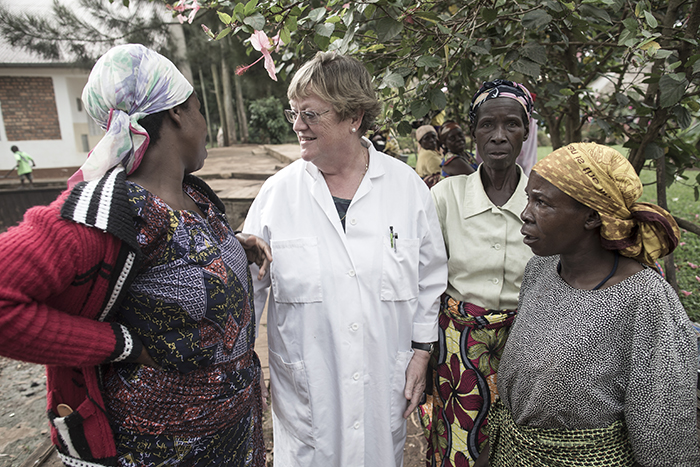
Professor Ellinor Ädelroth from Umeå, Sweden.
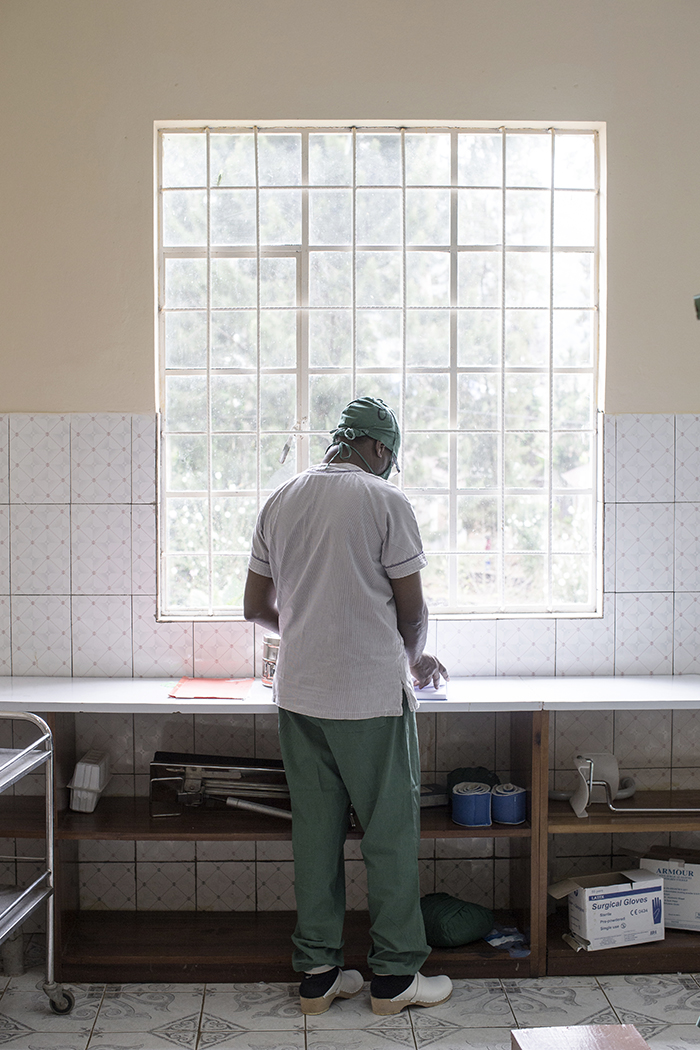
Women waiting to undergo surgery for fistulas. The reason is rape or the lack of prenatal care - both are results of the war.
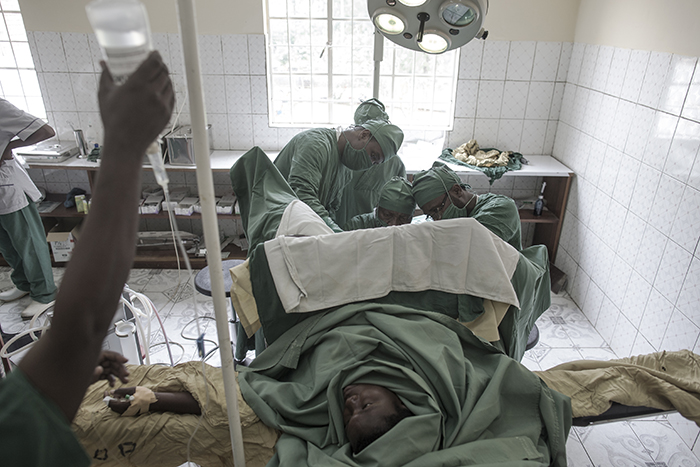
Doctor Mukwege attempting to repair a torn urethra.
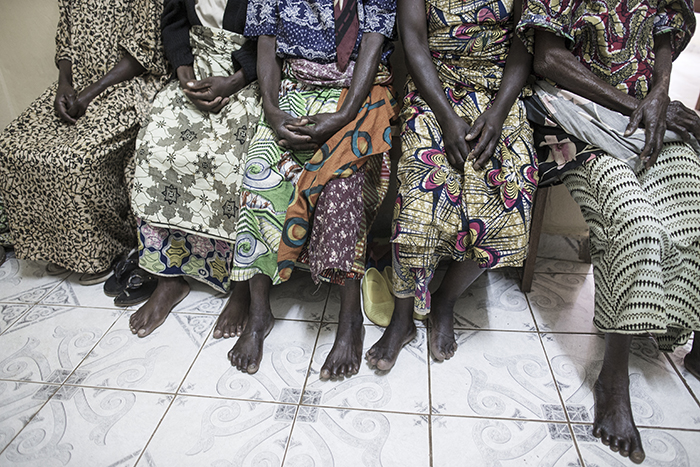
Doctor Mukwege goes away after the last surgery of the day. He has operated on rape injured since 1999, but is still touched by seeing the result of hatred.
|
He walks through a corridor where women sit in a long line waiting - they will all undergo surgery for fistulas - up to the first floor where there are two rooms filled with patients who are in the SSV project. They have deformed genitals, hepatitis infections and HIV / AIDS. Surgeons who come here to work have broken down the first day.
- I had a new doctor who started crying after only two patients. I said, "Be strong, this is just the beginning."
Doctor Mukwege knows what he's talking about.
- Up until a few years ago I went home every night and cried. I could not believe that people were capable of doing things that I saw in the hospital.
Today, he cannot go home. Last September, he spoke before the UN General Assembly. He raised the issue of systematic rape and the outside world's inaction and said among other things: "I have not the honor, nor the privilege to stand here before you today [...] The progress of our civilization is now in decline, it is in decline due to the new atrocities that we see in the Democratic Republic of Congo and in Syria, but also because of the deafening silence and lack of courage in the international community."
A month later, he became the victim of an assassination attempt in his house. His two daughters and their cousin were held hostage at gunpoint and the acting security guard was shot to death. Himself he managed to escape the bullets by throwing himself to the ground.
Now he lives with his wife and children in the hospital. The gates between the different departments are kept locked and his mobility is limited. He sits down in his office. The walls are adorned with certificates and awards. Prizes that he does not want. In 2009 he was nominated for the Nobel Peace Prize. Which he did not want neither.
- Receiving the price for what I do, that women are destroyed physically and mentally and that I treat them, I do not want that. Receiving an award every year without any difference, I do not want that. It's okay to receive a prize if they at the same time that they are prepared to fight by my side to stop the war.
He leans back. Knock out with the broad hands in the air.
- The United Nations have been observing for ten years, how long do they need to observe in order to understand that they need to intervene? When people die, when women are raped, when children are raped, how can it take ten years to observe?
He puts his arms crossed.
- They have all the information, but nobody does anything.
What could be done?
- The world has the capacity to stop the war. Because the conflict is not between tribes, not about ethnicity, not religion. The war is about money. One fights to control mines, to verify Congo's natural resources. Worldwide people get these natural resources; minerals for mobile phones. The world can continue to have access to them in a proper way, but to finance weapons that destroy women. The women who die do not even have a cell phone. They do not even know why they die.
Why do they die?
- You want the land. Without the people.
Systematic rape: a weapon that divides communities. In the maternity ward, the effect is obvious. Four children who will never get any surname were born this past week. In a country where you have the last name of your father, the children of rape get nothing.
Two of their mothers are minors. They have been thrown out from their homes. In a country where women are considered to have attracted the rapist and is inhabited by evil spirits, a raped cannot go on living with her family.
One mother is 22 years old. She had a husband before she was raped. She no longer has. In a country where it involves public shame to be with a woman that other men abused, a raped woman cannot remain married.
The last mother is gone.
- She came here, gave birth to the baby and went out the door. She did not want it.
Midwife shows the little girl who is wrapped in a blanket. A bottle of milk is next to her.
- She cries often. I think she lacks closeness. We do not know what to do with her. We named her Gloria.
An infant: orphan from birth. In a country without social care and functioning institutions.
Bukavus central prison is like a fortress on a hill above the city. It is released no unauthorized in. Reports of human rights abuses are many: prisoners have no beds, no functioning toilets and no food.
- There is a women's section, informs a guard.
He looks just as hungry as the prisoners who glimpses in the yard.
What are they convicted of?
- Abortion. Some have killed their men.
Men convicted of crimes against women there are fewer of. Mama London, a powerful woman who runs a day care center for children of rape, says that once they managed to catch a group of men who had raped a 13 year old.
- They went to prison but one of them bribed his way out after just a few weeks. He paid 1,000 dollars. For a sentence of 25 years.
Mama London day care, which was funded by Swedish Medical Mission is located not far from the prison. 60 children aged between three months and five years old are living here. The older children sit in a hall and sings.
At the front sits a boy in a white sweater who does not sing along. He is 3.5 years. When he was a baby and was breast fed by his mother in bed, a group of men stormed in and raped and killed her. Since then no one has seen him laugh.
- All these children are shy; they do not play as other children do. They do not jump around laughing as other children do. Espoir does not interact at all, says Mama London.
- But at least we have not had any deaths among the children since we started this project, she adds.
What, did they die earlier?
- Yes, they died on the streets. People don't love them. They call them >snakes children < - enemy children.
If you plant hatred in people, you cannot expect to get love. Doctor Mukweges sentence echoes in my head.
A research report from SIDA notes that a one-sided focus on rape complicates the efforts against sexual violence in conflict. The researchers believe that in order to change the situation of women we must also work with men and boys - both as perpetrators and as victims of gender violence. Even men and boys have been forced to have sex with family members and relatives; they have been forced to watch as relatives get raped, they have been forced to violent and humiliating sexual acts.
In this climate it is possible to recruit children into armed groups.
- Show me that you dare to kill, and you will get a weapon. Show me that you dare to kill and rape your mother and you will get a weapon. This is how our country rebel armies are built, and even government army, says Dr Mukwege .
Before leaving his office he summarizes the day: three surgeries, 40 outpatients. That's fewer than he normally has.
- Often they are 60. I work every day until late and the women keep coming in all the time.
How do you keep up?
- I have no choice. My desire is to be with these women and to support them. I cannot understand how strong these women are, and how they cope to stand up for themselves after all they've been through.
Some patients are still in the yard, one of them is the 14 -year-old girl who sits and gazes inward with her black shawl around her neck. Doctor Mukwege looks at them and says:
- My honor is not to stand before the UN General Assembly. My honor is to face these women. I cannot leave them.
FEMALE, AGE 17:
A man came to my house and said he wanted to have sex with me. I said no. Then he raped me. I did not tell anyone. When it began to appear that I was pregnant, my parents threw me out. They said they never wanted to see me anymore; they did not care about what happened to me, they did not care if I died. I lived in the street while the belly grew. Someone told me that I could give birth at Panzi. I do not know what will happen to me now. I would like to be a nurse but I cannot go to school because I have to take care of my son. I'll try to love him.
FEMALE, AGE 44:
Armed men took my village five years ago. They ripped us out of our homes and pinioned us in the square. Then they lit fires and heated plastic that they melted onto our bodies. They also went around and cut into people. My husband and my two small children they cut to pieces with machetes. They stuck me with knives everywhere and then they raped me. I do not know how many they were. After five, I lost consciousness. Two months ago, I was raped again when I was looking for food in the fields. Since then I walk with a crutch and urinate blood. I cannot cope to be among people and I mostly sit indoors. I do not dare to go out into the field either. As soon as I don't employ myself with anything, horrible pictures appear in front of my eyes. Pictures of how they cut my children into pieces. It often feels like I will get heart attack.
FEMALE, AGE 22:
I was in the woods and picked charcoal. Seven men with weapons shouting that I should put down my bag and lay me down on the ground. I realized that I would be raped so I refused. Then one of the men took out a knife and cut into my breasts. Then they raped me. One by one. Later I was found on the road. When I returned to my village my husband left me. The other men in the village said that he cannot be with a woman who has been raped, with a child which is not his. When I am discharged from Panzi I do not know where to go. I'm an orphan, I have no siblings. I cannot feel any happiness. I might as well die.
DR OF CONGO (CONGO-KINSHASA)
The size of Western Europe. 71,400,000 inhabitants. The world's poorest country with an average income of just under $ 1 per day. Have some of the world's richest mineral deposits of diamonds, gold, copper, tin, cobalt, uranium and coltan. Coltan found in mobile phones and makes wireless communication possible. Life expectancy is 47 years for men and 50 for women. Maternal mortality is about 900 per l00, 000 births. Number of children per woman is six. Abortion is prohibited and is penalized by five years in prison, even when the mother's life is threatened. Law against marital rape does not exist.
DOCTOR MUKWEGE, 58, NOMINATED FOR NOBEL PRIZE
Doctor Mukwege founded the Panzi Hospital in Bukavu in 1999 with the help of The Swedish Medical Mission. He has received a long range of prizes: 2007: The French Republic's human rights prize 2008: UN human rights prize 2009: The Olof Palme Prize 2009: African of the year 2009: The Nobel Peace Prize (nominated) 2010: Honorary doctorate in Medicine at Umeå University 2010: The University of Michigan Wallenberg Medal 2011: The King Baudouin International Development Prize 2011: The Clinton Global Citizen Award
THE WORLD'S DEADLIEST WAR
Congo gained independence from Belgium in 1960. Prime Minister Patrice Lumumba demanded that the country would no longer be an economic colony, but Lumumba was murdered in 1961 on the orders of U.S. President Eisenhower. The person responsible for the assassination, Mobutu Sese Seko, took power and became one of the world's richest men. During the first Congo war in 1996-97 Mobutu was overthrown by Laurent Kabila, whose son Joseph Kabila controls the country since 2001. The second Congo war, the deadliest in the world since the Second World War broke out in 1998. The war involved 9 countries and 30 armed groups that fought on Congolese natural resources. Since 2003 there is an ongoing peace process, but in the mineral-rich eastern Congo the fighting has continued and the number of rapes has increased dramatically. Both rebel groups and the Congolese army are using sexual violence as a weapon. Over six million people have lost their lives in the war, and about 2 million have been raped.
TRANSLATION MADE BY "DATI".
To find the original article please click on the link below.
http://www.lakartidningen.se/Aktuellt/Nyheter/2013/08/Tva-miljoner-valdtagna-i-krigets-Kongo/
http://www.lakartidningen.se/Aktuellt/Nyheter/2013/08/Tva-miljoner-valdtagna-i-krigets-Kongo/
Please help us donate to the Panzi Hospital.
EVERYBODY DESERVES THE HORRAY HORRAY FEELING SO HELP SPREAD IT!




